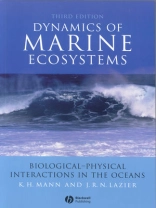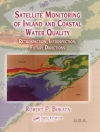The new edition of this widely respected text provides
comprehensive and up-to-date coverage of the effects of
biological-physical interactions in the oceans from the
microscopic to the global scale.
* considers the influence of physical forcing on biological
processes in a wide range of marine habitats including coastal
estuaries, shelf-break fronts, major ocean gyres, coral reefs,
coastal upwelling areas, and the equatorial upwelling system
* investigates recent significant developments in this rapidly
advancing field
* includes new research suggesting that long-term variability in
the global atmospheric circulation affects the circulation of ocean
basins, which in turn brings about major changes in fish stocks.
This discovery opens up the exciting possibility of being able to
predict major changes in global fish stocks
* written in an accessible, lucid style, this textbook is
essential reading for upper-level undergraduates and graduate
students studying marine ecology and biological oceanography
Tabela de Conteúdo
Contents.
Preface to Third Edition.
Preface to Second Edition.
Preface to First Edition.
1 Marine Ecology Comes of Age.
Part A: Processes on a Scale of less than 1
Kilometer.
2 Biology and Boundary Layers.
3 Vertical Structure of the Open Ocean: Biology of the Mixed
Layer.
4 Vertical Structure in Coastal Waters: Freshwater Run-off and
Tidal Mixing.
Part B: Processes on a Scale of 1-1000 Kilometers.
5 Vertical Structure in Coastal Waters: Coastal Upwelling
Regions.
6 Fronts in Coastal Waters.
7 Tides, Tidal Mixing, and Internal Waves.
Part C: Processes on a Scale of Thousands of
Kilometers.
8 Ocean Basin Circulation: The Biology of Major Currents, Gyres,
Rings, and Eddies.
9 Variability in Ocean Circulation: its Biological
Consequences.
10 The Oceans and Global Climate Change: Physical and Biological
Aspects.
Part D: Discussion and Conclusions.
11 Questions for the Future.
Appendix.
References.
Index
Sobre o autor
Dr Ken Mann has taught at universities in England and in
Canada and has carried out research on various aquatic ecosystems
including the River Thames and the kelp beds and estuaries of
eastern Canada. He is currently a Research Scientist Emeritus at
the Bedford Institute of Oceanography.
Dr John Lazier has been a physical oceanographer at the
Bedford Institute of Oceanography since the early 1960s. His
principal interest has been the circulation of the northwest
Atlantic Ocean, especially the response of the Labrador Sea to
decadal changes in the weather. He continues this work as a
Research Scientist Emeritus.












